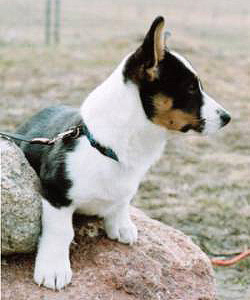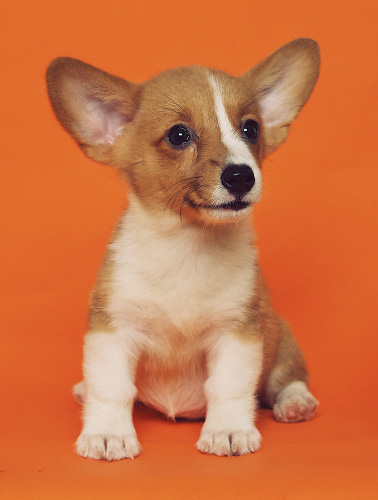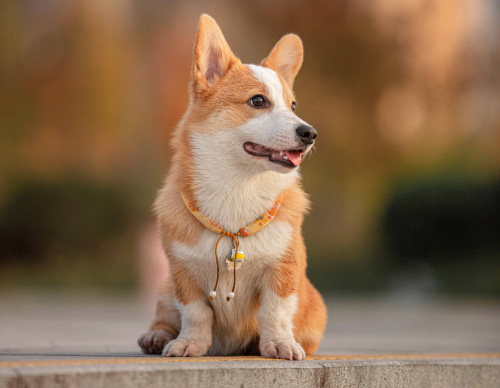
Cardigan Welsh Corgi
Group: Herding Group
Origin: Great Britain
Height: 10.5 to 12.5 inches at the withers.
– Ideal height is as near as possible to 12 in. (30 cm) at the shoulder.
Weight:
- – Males: 30 to 38 lbs
– Females: 25 to 34 lbs.
– Weight is in proportion to size, with over-all balance as prime consideration.

Bluetrix A Little Wicca Majic (Wicca)
Photo: Bluetrix Kennels
CLICK HERE to View Breeder Listings
Breed Profile
The Cardigan Welsh Corgi is a descendent of the Teckel family of dogs which also produced the Dachshund. The breed is believed to have been developed after being bred with local herding dogs in Wales with the purpose of developing an all-purpose farm dog. One that drove, guarded and herded cattle. The breed was little known outside of Wales until the 1920s. Corgis were recognized as pure-bred dogs in the U.K. in the 1920’s and, in 1934, the Pembroke and Cardigan Welsh Corgis were recognized as seperate breeds by the Kennel Club (England) as well as the American Kennel Club. The Cardigan is one of the less common breeds but is not considered a rarity. The breed was imported into the United States from Great Britain in 1931.
The Cardigan differs from the Pembroke Corgi in several ways — He has a full tail, is somewhat larger, longer in body, has rounded ears and comes in a wider variety of colours.
The Cardigan Corgi has a steady, even temperament. He is alert, intelligent, affectionate and adaptable. He makes a good family companion but does require plenty of outdoor exercise. The Corgi also excels at many activities including: conformation showing, obedience, herding, tracking, and agility. Because of his eagerness to please and love of people, the Cardigan also makes an excellent Therapy Dog.
His coat is hard-textured, short to medium length, and weatherproof with a good undercoat. All colours are acceptable, with or without white markings.

Health Issues
Corgis are generally a healthy breed. However, like all breeds of dogs, the Cardigan Welsh Corgi can have some health concerns, including: Progressive Retinal Atrophy has been reported in the Cardigan as well as Hip Dysplasia, Spinal Disc Problems, Autoimmune diseases, and Cataracts. The average lifespan for the Cardigan is 12 to 15 years.
If you are considering the adoption of a Corgi puppy, or any breed, it is very important to be selective in choosing a responsible and reputable breeder. Ensure that the prospective puppy’s parents have all health clearances. Breeding of any dog should not be done until after they have been proven to be free of evidence of significant hereditary diseases. (For more information on selecting a breeder, see the articles on the General Information page.)
Recommended Health Screening:
For the Cardigan Welsh Corgi, the CHICNote 1 database includes health screenings for:
- Hip Dysplasia
- Eye Examination by a board Ophthalmologist
- Progressive Retinal Atrophy (PRA) DNA Test
Additional Health Resources:
- Cardigan Health – Canine Intervertebral Disc Disease (IVDD) – From the Cardigan Welsh Corgi Club of America
- Health and Nutrition — Growing section of the Canada’s Guide to Dogs website which includes information on several health and nutrition related issues.
- Canine Health Information Center (CHIC) — Providing a source of health information for owners, breeders, and scientists that will assist in breeding healthy dogs. CHIC is a centralized canine health database jointly sponsored by the AKC/Canine Health Foundation (AKC/CHF) and the Orthopedic Foundation for Animals (OFA).
- AKC Canine Health Foundation — Working towards developing scientific advances in canine health.
- OFA – Companion Animal Eye Registry (CAER)
- Orthopedic Foundation for Animals (OFA)
- Ontario Veterinary College (OVC)
- University of Pennsylvania Hip Improvement Program (PennHip)
- HealthGene — HealthGene Corporation is the leading provider of veterinary DNA diagnostic services in Canada.
- Labgenvet — Laboratory of Veterinary Genetics is a Canadian diagnostic laboratory that offers a comprehensive service of DNA tests for veterinary genetic diseases.
Breed Standards
- CKC Breed Standard
- Illustrated Standard – From the Cardigan Welsh Corgi Club of America
- AKC Breed Standard
- UKC Breed Standard
- The Kennel Club (U.K.) Breed Standard

Grooming Information
The Cardigan Corgi’s coat should be brushed a couple of times a week. The nails should be kept fairly short and the hair between the toes and on the bottom of the feet should be trimmed occasionally. As with all dogs, to help promote good health, teeth should also be brushed regularly.
- Grooming — This section of the Canada’s Guide to Dogs website includes tips, articles and information covering all aspects of dog grooming along with a listing of Groomers from across Canada.
Training Resources
- Training — For training information, see this growing section of the Canada’s Guide to Dogs website for tips, articles, as well as listings of training centres across Canada.
Additional Information
- Is a Dog from the Herding Group Right for You?
- Herding Dogs — The Herding Dogs section of the Canada’s Guide to Dogs website includes training and general information about Herding/Stock Dogs; listing of Stock Dog Clubs and Associations; listing of upcoming shows and events; and more.
- Clubs, Sports & Activities — For information on the many sports and activities you can get involved in with your dog.
- Working Dogs — The Working Dogs section of the Canada’s Guide to Dogs website provides information and listings of organizations that are involved in various dog jobs, such as Guide Dogs, Therapy Dogs, Police Dogs, Protection Dogs, and much more.
Discussion Groups/Forums:
- Show Cardi-L — A discussion forum for Cardigan Welsh Corgi conformation and performance issues.
*NOTE 1: CHIC – The Canine Health Information Center “is a database of consolidated health screening results from multiple sources. Co-sponsored by the Orthopedic Foundation for Animals (OFA) and the American Kennel Club (AKC) Canine Health Foundation, CHIC works with parent clubs to identify health screening protocols appropriate for individual breeds. Dogs tested in accordance with the parent club established requirements, that have their results registered and made available in the public domain are issued CHIC numbers.” To learn more, visit: www.caninehealthinfo.org
*NOTE 2: The Fédération Cynologique International (FCI) is the World Canine Organization, which includes 91 members and contract partners (one member per country) that each issue their own pedigrees and train their own judges. The FCI recognizes 344 breeds, with each being the “property” of a specific country. The “owner” countries write the standards of these breeds in co-operation with the Standards and Scientific Commissions of the FCI, and the translation and updating are carried out by the FCI. The FCI is not a breed registry nor does it issue pedigrees.
Breed Listing
Quick Links
Get In Touch
- Email: canadasguidetodogs@gmail.com
- Email: info@canadasguidetodogs.com
- Visit us on Facebook: www.facebook.com/CanadasGuideToDogs
— CanadasGuideToDogs.com is an Amazon Associate as well as a participant in various affiliate programs, as such fees are earned from qualifying purchases.

